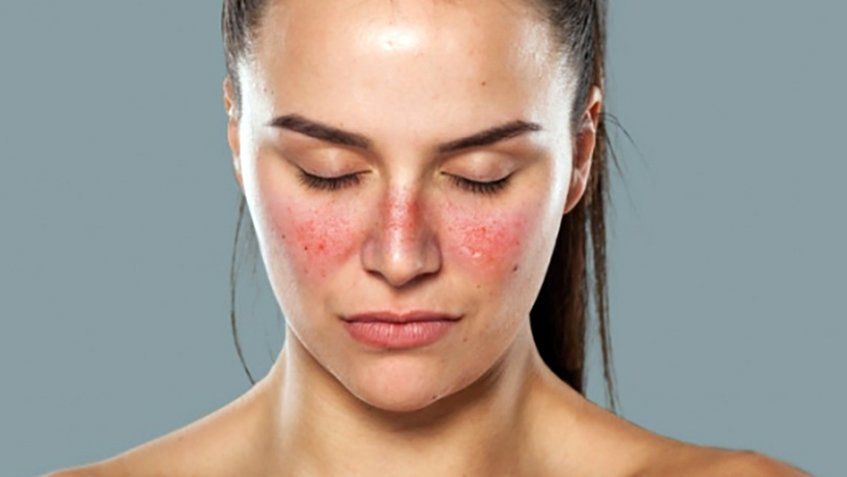Contact Admission
International Collaboration
Scarlet fever and coffee drinking habits
This article was updated by Uptodate in December 2018
 Rosacea is a dermatological disease that occurs in adults of all races, but is most commonly found in people with light skin. This disease rarely occurs in children. The pathogenesis of scarlet fever is not well understood. Factors such as abnormalities in the innate immune system, inflammatory responses to skin microorganisms, exposure to ultraviolet rays and increased blood vessel reactivity are identified as risk factors. muscle contributes to the disease. Signs of the disease such as prolonged erythema of the face, lumpy skin, pustules, flushing, a burning or needle-like sensation, edema and dry skin are potential signs of rosacea. Unusual manifestations sometimes occur in the eye area. In most patients, clinical evaluation is sufficient to diagnose erythema and rule out other disorders that may resemble scarlet fever. Skin biopsy is rarely indicated but may be useful in the case of another suspected disease that can be relied on by specific histopathology to aid in the diagnosis of erythema. The eye lesions may appear independently or be related to the skin manifestations of erythema. The patient may exhibit features such as eyelid vasodilation, conjunctivitis, and eye irritation. Patients with signs or symptoms of rosacea should be referred to an ophthalmologist for further evaluation.
Rosacea is a dermatological disease that occurs in adults of all races, but is most commonly found in people with light skin. This disease rarely occurs in children. The pathogenesis of scarlet fever is not well understood. Factors such as abnormalities in the innate immune system, inflammatory responses to skin microorganisms, exposure to ultraviolet rays and increased blood vessel reactivity are identified as risk factors. muscle contributes to the disease. Signs of the disease such as prolonged erythema of the face, lumpy skin, pustules, flushing, a burning or needle-like sensation, edema and dry skin are potential signs of rosacea. Unusual manifestations sometimes occur in the eye area. In most patients, clinical evaluation is sufficient to diagnose erythema and rule out other disorders that may resemble scarlet fever. Skin biopsy is rarely indicated but may be useful in the case of another suspected disease that can be relied on by specific histopathology to aid in the diagnosis of erythema. The eye lesions may appear independently or be related to the skin manifestations of erythema. The patient may exhibit features such as eyelid vasodilation, conjunctivitis, and eye irritation. Patients with signs or symptoms of rosacea should be referred to an ophthalmologist for further evaluation.
 Historically, people with scarlet fever have been advised not to consume coffee and other hot drinks as it can aggravate their illness. However, a study in Nurses' Health Study II analyzed data from more than 80,000 women showed that, compared to the women who consumed the least coffee, the women with the highest coffee consumption had less a greater tendency to get rosacea. Additionally, the increase in caffeine intake is inversely related to the risk of scarlet fever. There was no association between the risk of scarlet fever and the consumption of decaffeinated coffee. These findings suggest that it is not necessary to restrict coffee intake in patients with scarlet fever.
Historically, people with scarlet fever have been advised not to consume coffee and other hot drinks as it can aggravate their illness. However, a study in Nurses' Health Study II analyzed data from more than 80,000 women showed that, compared to the women who consumed the least coffee, the women with the highest coffee consumption had less a greater tendency to get rosacea. Additionally, the increase in caffeine intake is inversely related to the risk of scarlet fever. There was no association between the risk of scarlet fever and the consumption of decaffeinated coffee. These findings suggest that it is not necessary to restrict coffee intake in patients with scarlet fever.
Other news
- How Dangerous Is Nipah Virus? Medical Alert and Urgent Health Recommendations ( 14:13 - 27/01/2026 )
- Predicting Disease from Sleep – A New Breakthrough Study ( 14:01 - 13/01/2026 )
- Medical advances predicted to break through in 2026 ( 13:54 - 12/01/2026 )
- Vietnamese medical miracles in 2025 – inspiration for medical students ( 07:54 - 07/01/2026 )
- Updating the SOFA-2 Score: A New Standard in the Assessment of Multiple Organ Failure After Three Decades ( 10:40 - 31/12/2025 )
- Home AEDs: High Life-Saving Effectiveness, but Not Cost-Effective at Current Prices ( 14:12 - 18/12/2025 )
- Artificial Intelligence and Pediatric Care ( 08:27 - 16/12/2025 )
- Applying Clinical Licensing Principles to Artificial Intelligence ( 09:36 - 08/12/2025 )
- U.S. Approves Targeted Lung Cancer Therapy Datroway ( 08:43 - 25/06/2025 )
- Therapeutic potential and mechanisms of mesenchymal stem cell-derived exosomes as bioactive materials in tendon–bone healing ( 08:38 - 23/11/2023 )


















